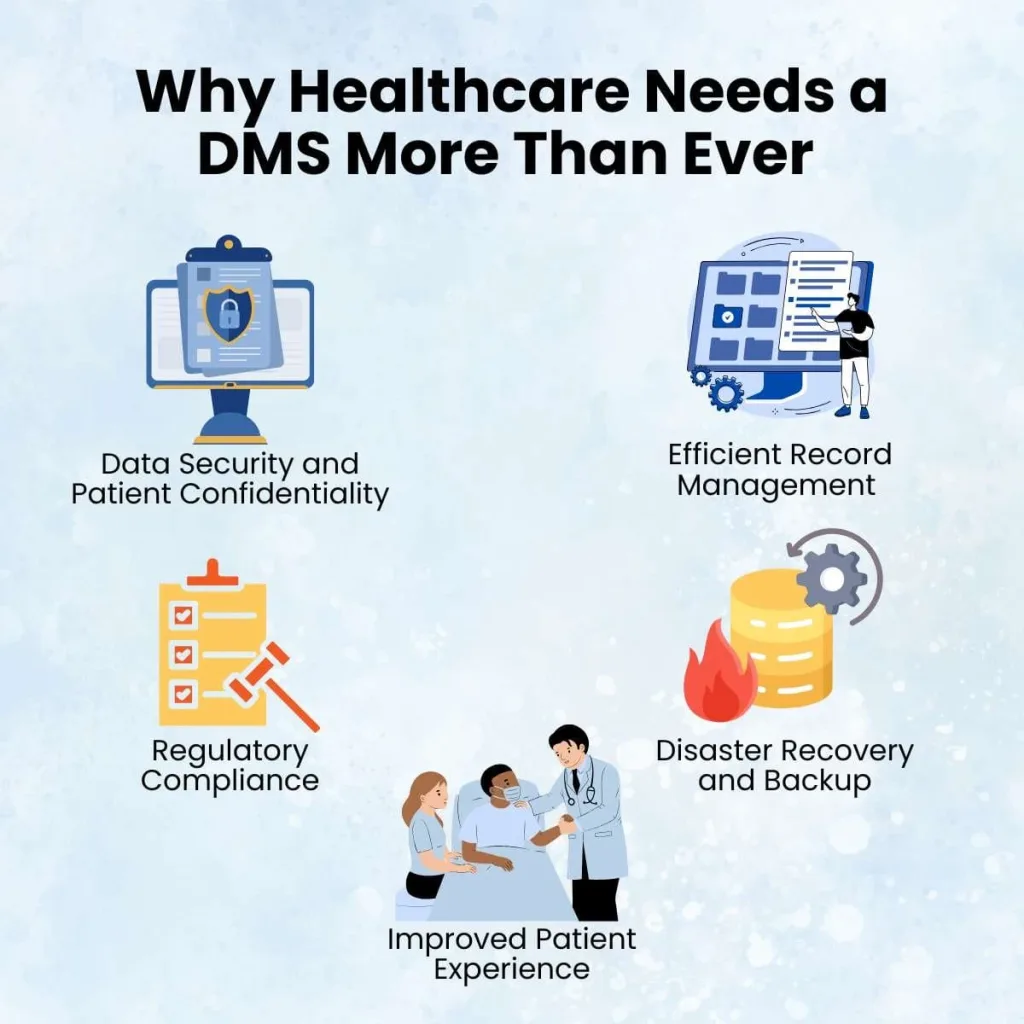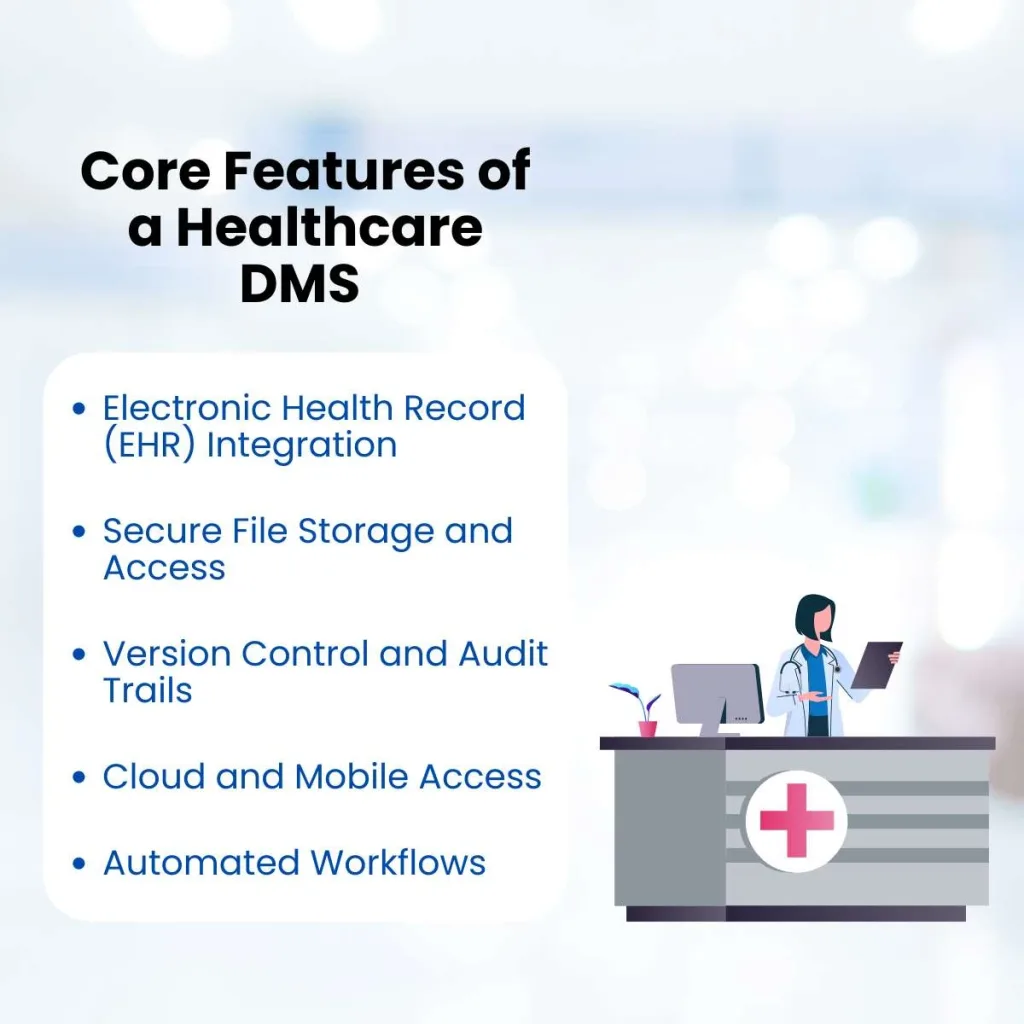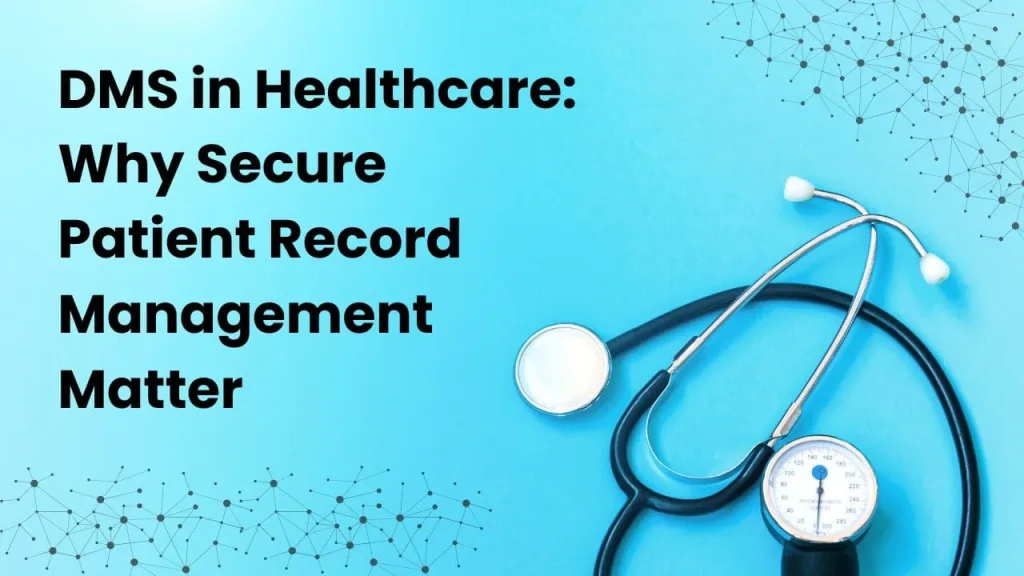DMS in healthcare With the evolution of technology, everything is going digital, and as parts where patients’ sensitive information including their prescriptions, lab reports, insurance claims, along with treatment histories are intricately amalgamated becoming digital, clinics and hospitals need to manage them strategically. There is an extensive amount of subsequent information which requires utmost diable managing because it could result in a calamitous data breach. With stringent legal guardianship in place, making and accurately managing all the aforementioned aspects is becoming crucial.
This is where a Document Management System or DMS comes into play. A DMS can transform how healthcare organizations manage, access, and secure patient records. In this post, we will focus on how DMS aids the healthcare sector and decreases security breaches, compliance risks, as well as adverse events to patients.
Table of Contents
What is a DMS in Healthcare?
A Document Management System (DMS) is a piece of software used to store, organize, monitor, and safeguard documents. In healthcare, DMS solutions are specially designed to process Electronic Medical Records (EMRs), Electronic Health Records (EHRs), lab tests, patient charts, insurance claims, drug prescriptions, and more.
Compared to older systems of filing paper documents or primitive forms of electronic file storage, a DMS designed for use in the healthcare industry includes sophisticated tools such as role permissions, access audit logs, automated processes, cloud storage, and data encryption to maintain organizational productivity and compliance.
Why Healthcare Needs a DMS More Than Ever

Concerns ranging from data breaches to privacy, coupled with the need for digital health records have made achieving their goal a little tricky for healthcare organizations. Here’s why implementing an advanced DMS is indispensable – it’s a pressing need now.
1. Data Security and Patient Confidentiality
It is within the scope of legal and ethical considerations for healthcare practitioners to protect the information of their patients. There has to be compliance with data privacy regulations which include HIPAA (United States), GDPR (European Union), and DISHA (India). A DMS guarantees the following which Help With Business Data Management:
- End-to-end encryption
- Role-based access control
- Two-factor authentication
- Document activity logs.
This prevents unauthorized access, data leaks, and breaches, thereby protecting patient trust and legal integrity.
2. Efficient Record Management
The locating of documents within paper files or disparate systems is slow and often yields incorrect results. Thanks to a DMS, doctors and admin staff can find patient records electronically through tagging, searching filters, and file indexing, making their work far more efficient.
3. Regulatory Compliance
Healthcare is one of the heavily regulated industries. A DMS automates compliance and ensures:
- Audit trails are kept
- Retention schedules are managed
- Backup and Recovery of data is done
- Facilitated sharing of documents
This helps organizations evade legal implications and attain compliance effortlessly.
4. Disaster Recovery and Backup
Consider the consequences of a fire, flood, or ransomware on your office: losing thousands of patient records. This is exactly why a cloud-based DMS is so useful. Not only does it include automated backups, but it also offers version control and disaster recovery options which promote data safety.
5. Improved Patient Experience
Having quicker and more precise access to health records enables quicker decision-making, minimizes redundancy, and better-tailored treatment options for clinicians. Patients get the advantage of faster-coordinated services with improved administrative processes.
Core Features of a Healthcare DMS

Here’s what makes a DMS suitable for the healthcare sector:
1. Electronic Health Record (EHR) Integration
A healthcare DMS must connect effortlessly to existing EHR or EMR systems, and provide consolidated access to all related patient information through one platform.
2. Secure File Storage and Access
Scanned reports, X-rays, and prescriptions are all kept confidential with sophisticated encryption, password privacy, and access control depending on their user roles (physician, nurse practitioner, administrator, insurance representative).
3. Version Control and Audit Trails
All changes made to a file are monitored. The physicians and the staff members can see who opened or modified a document along with the timestamp of these actions. This is essential for medical responsibility as well as legal protection.
4. Cloud and Mobile Access
Healthcare professionals can view medical history on any device from any location, which is beneficial to telemedicine and remote consultations, along with on-call visits.
5. Automated Workflows
Automated systems can take care of verification calls, appointment confirmations and sharing lab reports, eliminating the work while improving accuracy.
Benefits of Using a DMS in Healthcare
Here’s a summary of the tangible benefits for hospitals, clinics, and healthcare professionals:
| Benefit | Impact |
|---|---|
| Enhanced Data Security | Protects sensitive patient information from breaches. |
| Faster Access to Records | Improves diagnosis and reduces waiting time. |
| Better Compliance | Meets HIPAA, GDPR, and national health data regulations. |
| Streamlined Operations | Automates routine tasks and reduces paperwork. |
| Lower Operational Costs | Cuts down on printing, storage, and manual labor. |
| Improved Patient Satisfaction | Provides faster, more coordinated care. |
Read More: Top 10 Benefits of a Document Management System for Modern Businesses
Conclusion
As patient care and data protection become integrated, implementing a Document Management System in every modern healthcare institution is essential. No longer is it simply about going paperless—it’s about providing more efficient healthcare services along with improved safety.
No matter how big or small your clinic or hospital may be, integrating a secure and scalable DMS will forever change the way you manage patient documents—and the way your patients receive care.

